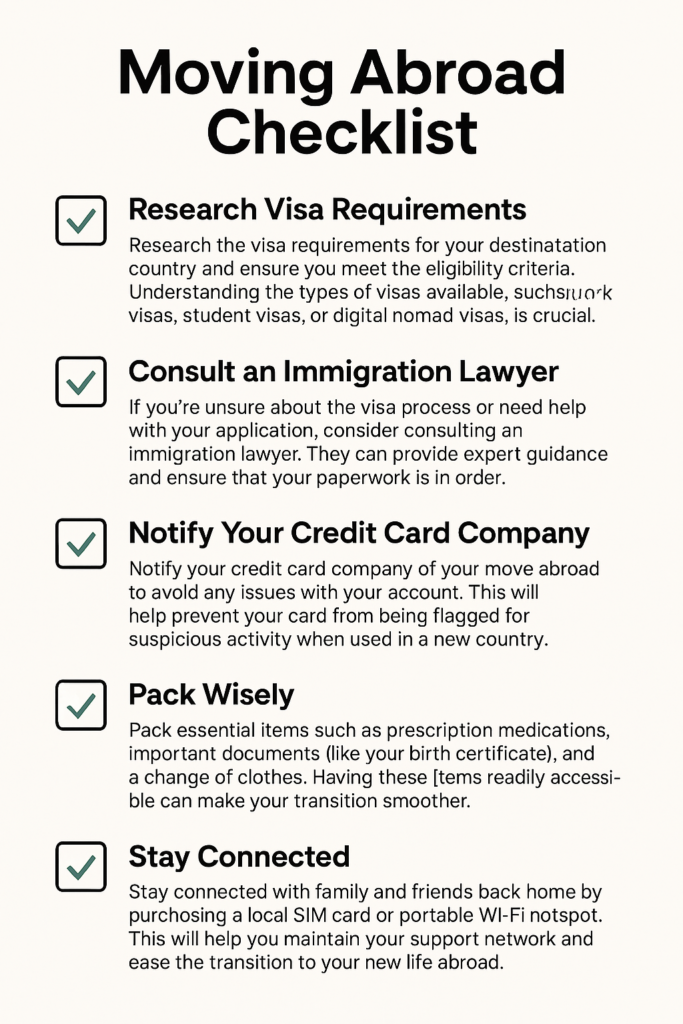Moving abroad can be both thrilling and daunting. Whether you’re an expat chasing new adventures, a digital nomad seeking freedom or an entrepreneur expanding your horizons, that leap to another country can be life-changing. But it’s not all sunsets on foreign beaches or picturesque cityscapes. Relocating comes with its own set of challenges and preparation is what smooths that transition. One of the most significant challenges is culture shock, which involves the emotional and psychological adjustments individuals face when moving abroad.
Having copies of your vital documents both paper and digital, ready to go can prevent a lot of stress when you need them. That might be during a residency appointment or any other urgent situation. Keeping those documents secure and backed up means you can access them when you need to.
We’re going to cover the five essential things you need to know before moving abroad. That includes legal requirements, personal adjustments and everything in between.
1. Understanding Your Motivations and Culture Shock
Why are you really moving abroad? Is it for a new adventure, better job opportunities or to escape the routine of your home country? Being honest with yourself about your reasons for moving is crucial. Research has shown that people who move abroad for the right reasons tend to have a more positive experience. Individuals who have moved abroad often face challenges like language barriers but also enjoy benefits such as quality of life improvements and personal growth.
Take some time to think about what you hope to achieve or experience in your new country. What are your goals for moving abroad? What kind of lifestyle do you want to have? Are you looking for a fresh start or a new challenge? And are you willing to adapt to a new culture and way of life? Answering these questions will help you make informed decisions about your move and set yourself up for success.
2. Choosing Your Destination

With so many countries to choose from, selecting the right one can be overwhelming. But by considering a few key factors, you can narrow down your options and find the perfect fit.
When choosing your destination, think about the cost of living. Compare it to your current expenses. Consider housing, food, transportation and healthcare. What kind of culture do you want to experience? Do you prefer a fast-paced city or a relaxed rural lifestyle? Are you interested in learning a new language or immersing yourself in a new culture?
If you’re employee job opportunities are also a major consideration. Research the job market in your desired country. Look at industry trends, job availability and salary ranges. Visa requirements are another thing to think about. Research the eligibility criteria and make sure you meet them. And finally, consider the safety and security of your desired country. Living in a capital city often provides better amenities, infrastructure, and lifestyle options compared to other locations within the country.
Some popular destinations for expats include Portugal, Thailand, the UAE. Each has its own unique advantages and disadvantages.
3. Research and Planning for Local Culture
Once you’ve chosen your destination, it’s time to start researching and planning your move. Learn as much as you can about your new country. Read up on its culture, customs and way of life. Make a checklist of tasks to complete before your move. That might include notifying your credit card company, setting up healthcare and finding accommodation.
Budgeting and saving are also essential. Create a budget for your move and start saving for expenses like flights, accommodation and living costs. Join online communities and forums to connect with other expats who have made the move to your desired country. If you’re unsure about the visa process or need help with paperwork, consider hiring an immigration lawyer to guide you through the process. Obtaining visas for other countries can be complex due to the unique challenges posed by various immigration laws and policies.
By doing your research and planning carefully, you can ensure a smooth transition to your new life abroad.
4. Visa, Digital Nomad Visas, and Residency Requirements

Visa requirements can make or break your plans to move abroad. Without the correct paperwork, you could face fines, deportation or long-term restrictions on visiting the country again. Research the types of visas available. Common types include work visas, student visas and entrepreneur visas. For those not planning to work, a tourist visa may be sufficient. Some countries offer special digital nomad visas for remote workers. Additionally, several countries in Europe offer digital nomad visas and Golden Visas to attract remote workers and investors.
Understanding the visa and residency requirements for your destination country is crucial. Research the eligibility criteria and make sure you meet them. This will help you avoid any last-minute surprises and ensure a smooth transition to your new life abroad.
When moving abroad, it’s essential to stay within the legal boundaries. Understand the duration, renewal process and options to transition to permanent residency or citizenship where applicable. (And yes, some countries make that process much easier than others.)
That’s where expert guidance comes in. Immigration laws can be complex, so consult a qualified immigration professional who can guide you through the legalities and ensure your residence permit is valid. Countries like Canada and Germany have streamlined immigration processes, while others may require you to navigate layers of bureaucracy. Research ahead and be prepared for that.
Taxes can follow you even after leaving your home country. If you’re not prepared, you could end up with double taxation or missed financial opportunities. Here are some tax implications and financial planning considerations to keep in mind:
- Understand tax residency rules. Some countries tax based on where you live, while others tax based on your citizenship. If you’re American, for example, you’ll still need to file taxes with the IRS even if you’re earning abroad.
- Double taxation agreements can prevent you from paying taxes twice on the same income. Check if your home country has agreements in place with your new country.
- Offshore banking and wealth planning can help you preserve your wealth if you’re moving to a country with less robust financial protections. And when choosing a destination, consider the lifestyle you want. Capital cities often offer a vibrant lifestyle compared to other locations, with better public transportation and healthcare infrastructure.
Entrepreneurs can relocate to tax-friendly nations like the UAE, Singapore or Malta to minimize tax burdens while remaining compliant.
5. Adapting to a New Culture

Adapting to a new culture can be both challenging and rewarding when moving abroad. It’s essential to be open-minded and flexible as you navigate the local customs, traditions, and way of life. Here are some tips to help you adapt to a new culture:
- Research the Local Culture: Before you move abroad, take the time to research the local culture, customs, and traditions of your new country. Understanding the local way of life will help you avoid cultural faux pas and make a positive impression.
- Learn the Local Language: Learning the local language is crucial for adapting to a new culture. It will help you communicate with locals, understand the culture better, and navigate everyday life more smoothly. Apps like Duolingo or in-person language courses can be incredibly helpful.
- Be Respectful: Show respect for the local culture and customs. Avoid making assumptions or stereotypes about the local culture, and be open to learning and understanding new ways of life. This respect will go a long way in building positive relationships with locals.
- Join Local Groups: Joining local groups or clubs can help you meet fellow expats and locals who share similar interests. This can be a great way to build a social network and learn more about the local culture. Platforms like Meetup or Internations can be useful for finding these groups.
- Be Patient: Adapting to a new culture takes time, so be patient with yourself. Don’t get discouraged if you make mistakes or struggle to understand the local customs. With time and effort, you’ll find your footing and start to feel more at home.
Some popular destinations for digital nomads include:
- Chiang Mai, Thailand: Known for its affordable cost of living, rich culture, and vibrant expat community.
- Medellín, Colombia: A city transformed, Medellín offers a great climate, cultural attractions, and a growing expat community.
- Lisbon, Portugal: A charming city with a mild climate, rich history, and a growing expat community.
- Bali, Indonesia: A tropical paradise with a relaxed atmosphere, beautiful beaches, and a thriving expat community.
- Dubai, The UAE: A real paradise for business people and luxury lovers. 0% Tax and sunshine what else do you need?
Quick Checklist
Making the move abroad can be a complex and bureaucratic process. Here are some tips to help you navigate the process smoothly:

Final Thoughts: Keep More, Grow More
Learning how to legally reduce your corporate taxes is one of the most powerful steps you can take to boost net income, reinvest profits, and future-proof your business. Whether you’re deducting office supplies, optimizing your business structure, or leveraging international setups, the key is intentional tax planning with professional support.
